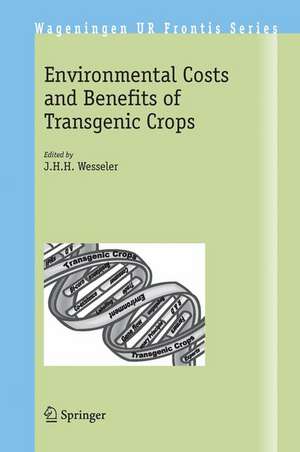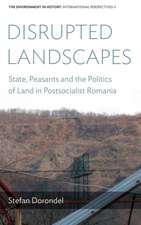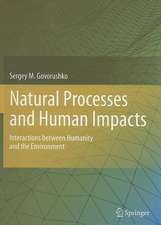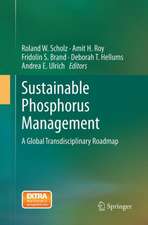Environmental Costs and Benefits of Transgenic Crops: Wageningen UR Frontis Series, cartea 7
Editat de Wageningen Universityen Limba Engleză Paperback – iun 2005
Each contribution includes a comment, which raises questions that need further investigation. A summary of the questions in research topics concludes the contributions. The book will be of interests for policy makers as well as scholars working in established areas of social and natural sciences with an interest in the complex issues related to the release of transgenic crops.
| Toate formatele și edițiile | Preț | Express |
|---|---|---|
| Paperback (1) | 639.59 lei 6-8 săpt. | |
| SPRINGER NETHERLANDS – iun 2005 | 639.59 lei 6-8 săpt. | |
| Hardback (1) | 645.79 lei 6-8 săpt. | |
| SPRINGER NETHERLANDS – 2 mar 2005 | 645.79 lei 6-8 săpt. |
Din seria Wageningen UR Frontis Series
- 15%
 Preț: 633.35 lei
Preț: 633.35 lei - 18%
 Preț: 940.72 lei
Preț: 940.72 lei - 18%
 Preț: 947.04 lei
Preț: 947.04 lei - 18%
 Preț: 1230.35 lei
Preț: 1230.35 lei - 18%
 Preț: 948.16 lei
Preț: 948.16 lei - 24%
 Preț: 1042.98 lei
Preț: 1042.98 lei - 18%
 Preț: 942.44 lei
Preț: 942.44 lei - 24%
 Preț: 1028.84 lei
Preț: 1028.84 lei - 24%
 Preț: 787.50 lei
Preț: 787.50 lei - 18%
 Preț: 946.55 lei
Preț: 946.55 lei - 24%
 Preț: 1035.78 lei
Preț: 1035.78 lei - 18%
 Preț: 944.06 lei
Preț: 944.06 lei - 18%
 Preț: 1213.34 lei
Preț: 1213.34 lei - 24%
 Preț: 1045.93 lei
Preț: 1045.93 lei - 18%
 Preț: 1224.36 lei
Preț: 1224.36 lei - 18%
 Preț: 1218.83 lei
Preț: 1218.83 lei - 18%
 Preț: 1218.06 lei
Preț: 1218.06 lei - 18%
 Preț: 941.38 lei
Preț: 941.38 lei - 18%
 Preț: 938.66 lei
Preț: 938.66 lei - 15%
 Preț: 639.08 lei
Preț: 639.08 lei - 18%
 Preț: 941.68 lei
Preț: 941.68 lei - 24%
 Preț: 791.79 lei
Preț: 791.79 lei -
 Preț: 380.63 lei
Preț: 380.63 lei - 15%
 Preț: 629.56 lei
Preț: 629.56 lei
Preț: 639.59 lei
Preț vechi: 752.45 lei
-15% Nou
Puncte Express: 959
Preț estimativ în valută:
122.38€ • 127.79$ • 101.06£
122.38€ • 127.79$ • 101.06£
Carte tipărită la comandă
Livrare economică 15-29 aprilie
Preluare comenzi: 021 569.72.76
Specificații
ISBN-13: 9781402032486
ISBN-10: 140203248X
Pagini: 284
Ilustrații: IX, 269 p.
Dimensiuni: 155 x 235 x 15 mm
Greutate: 0.4 kg
Ediția:2005
Editura: SPRINGER NETHERLANDS
Colecția Springer
Seria Wageningen UR Frontis Series
Locul publicării:Dordrecht, Netherlands
ISBN-10: 140203248X
Pagini: 284
Ilustrații: IX, 269 p.
Dimensiuni: 155 x 235 x 15 mm
Greutate: 0.4 kg
Ediția:2005
Editura: SPRINGER NETHERLANDS
Colecția Springer
Seria Wageningen UR Frontis Series
Locul publicării:Dordrecht, Netherlands
Public țintă
ResearchCuprins
Environmental benefits and costs of transgenic crops: introduction.- Environmental effects of genetically modified crops: differentiated risk assessment and management.- Comment on Ervin and Welsh: Environmental effects of genetically modified crops: differentiated risk assessment and management.- Assessing the environmental impact of changes in pesticide use on transgenic crops.- Comment on Kleter and Kuiper: Environmental fate and impact considerations related to the use of transgenic crops.- Biological limits on agricultural intensification: an example from resistance management.- Comment on Laxminarayan and Simpson: Biological limits on agricultural intensification: an example from resistance management.- Stability of pathogen-derived Potato virus Y resistance in potato under field conditions and some aspects of their ecological impact.- Comment on Schubert, Matoušek and Supp: Stability of pathogen-derived Potato virus Y resistance in potato under field conditions and some aspects of their ecological impact.- Bacillus thuringiensis resistance management: experiences from the USA.- Comment on Hurley: Bacillus thuringiensis resistance management: experiences from the USA.- Gene flow from crops to wild plants and its population-ecological consequences in the context of GM-crop biosafety, including some recent experiences from lettuce.- Comment on Van de Wiel, Groot and Den Nijs: Gene flow from crop to wild plants and its population-ecological consequences in the context of GM-crop biosafety, including some recent experiences from lettuce.- Irreversible costs and benefits of transgenic crops: what are they?.- Comment on Demont, Wesseler and Tollens: Irreversible costs and benefits of transgenic crops: what are they?.- Ex post evidence on adoption of transgenic crops:US soybeans.- Comment on Weaver: Ex post evidence on adoption of transgenic crops: US soybeans.- Spatial and temporal dynamics of gene movements arising from deployment of transgenic crops.- Comment on Gilligan, Claessen and Van den Bosch: Spatial and temporal dynamics of gene movements arising from deployment of transgenic crops.- Minimum distance requirements and liability: implications for co-existence.- Comment on Soregaroli and Wesseler: Minimum distance requirements and liability: implications for co-existence.- Biotechnology, the US-EU dispute and the Precautionary Principle.- Comment on Van den Belt: Biotechnology, the US-EU dispute and the Precautionary Principle.- Do patent-style intellectual property rights on transgenic crops harm the environment?.- Comment on Goeschl: Do patent-style intellectual property rights on transgenic crops harm the environment?.- Agricultural biotechnology and globalization: U.S. experience with public and private sector research.- Comment on Graff, Roland-Holst and Zilberman: Agricultural biotechnology and lobalization: how will public-private partnership evolve?.- Will consumers lose or gain from the environmental impacts of transgenic crops?.- Comment on Hobbs and Kerr: Will consumers lose or gain from the environmental impacts of transgenic crops?.- Conclusions.
Caracteristici
Concern about the environmental impacts of transgenic crops is one of the major reasons for the EU’s quasi-moratorium on GMOs Shows that the economic implications of these concerns are far-reaching and complex Range from the farm level to research and technology development on the one side and consumer reactions on the other side

















